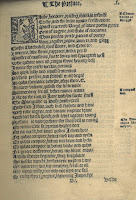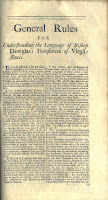 Although we don't have a 1513 edition of Douglas's Eneados, we are lucky enough to have a version printed in 1553 that was a gift from Allerton Hickmott, class of 1917. This small but handsome book is printed with a blackletter typeface that gives it a distinctly early modern look and displays numerous lovely little woodcut initials throughout the volume.
Although we don't have a 1513 edition of Douglas's Eneados, we are lucky enough to have a version printed in 1553 that was a gift from Allerton Hickmott, class of 1917. This small but handsome book is printed with a blackletter typeface that gives it a distinctly early modern look and displays numerous lovely little woodcut initials throughout the volume. We also have a much later edition from 1710 that formerly belonged to George Ticknor, class of 1803. Ticknor's copy of the text is a fascinating look into textual transmission and reception several centuries after the translation's initial creation. The typeface is now mostly roman, and therefore more familiar to a modern eye. Also, the publisher has included numerous linguistic tools, such as a list of general rules and a glossary, to assist the reader in understanding Douglas's strange and seemingly foreign language.
We also have a much later edition from 1710 that formerly belonged to George Ticknor, class of 1803. Ticknor's copy of the text is a fascinating look into textual transmission and reception several centuries after the translation's initial creation. The typeface is now mostly roman, and therefore more familiar to a modern eye. Also, the publisher has included numerous linguistic tools, such as a list of general rules and a glossary, to assist the reader in understanding Douglas's strange and seemingly foreign language.To try your eye and mind at Middle Scots, perhaps with the help of an early 18th-century appendix or two, come to Rauner and thumb through these wonderful gifts from two important alumni. For the 1553 edition, ask for Hickmott 399, while the 1710 edition is Ticknor LT V7aEd.

